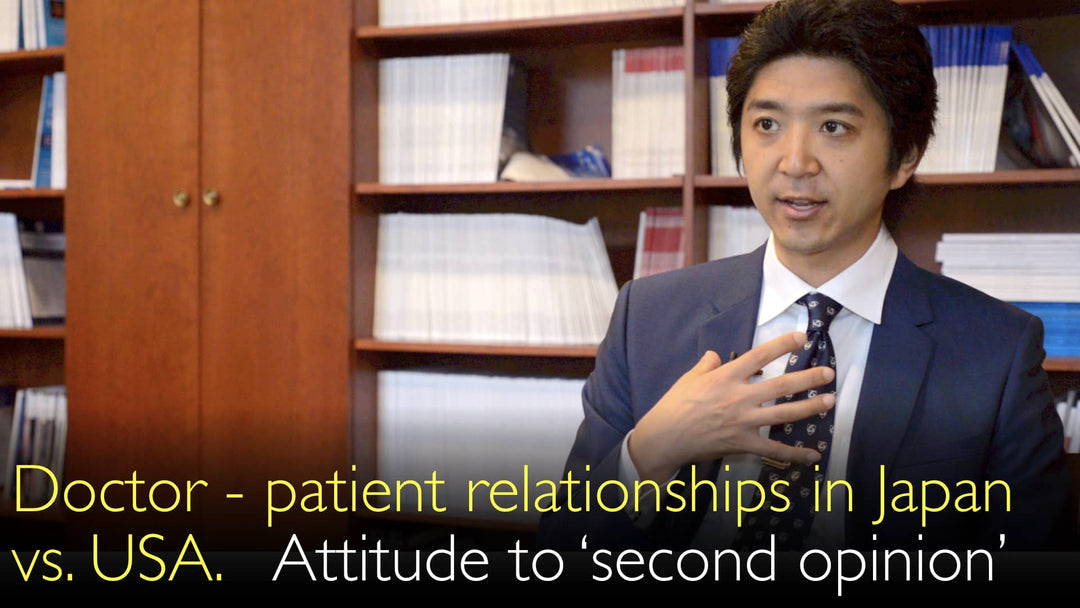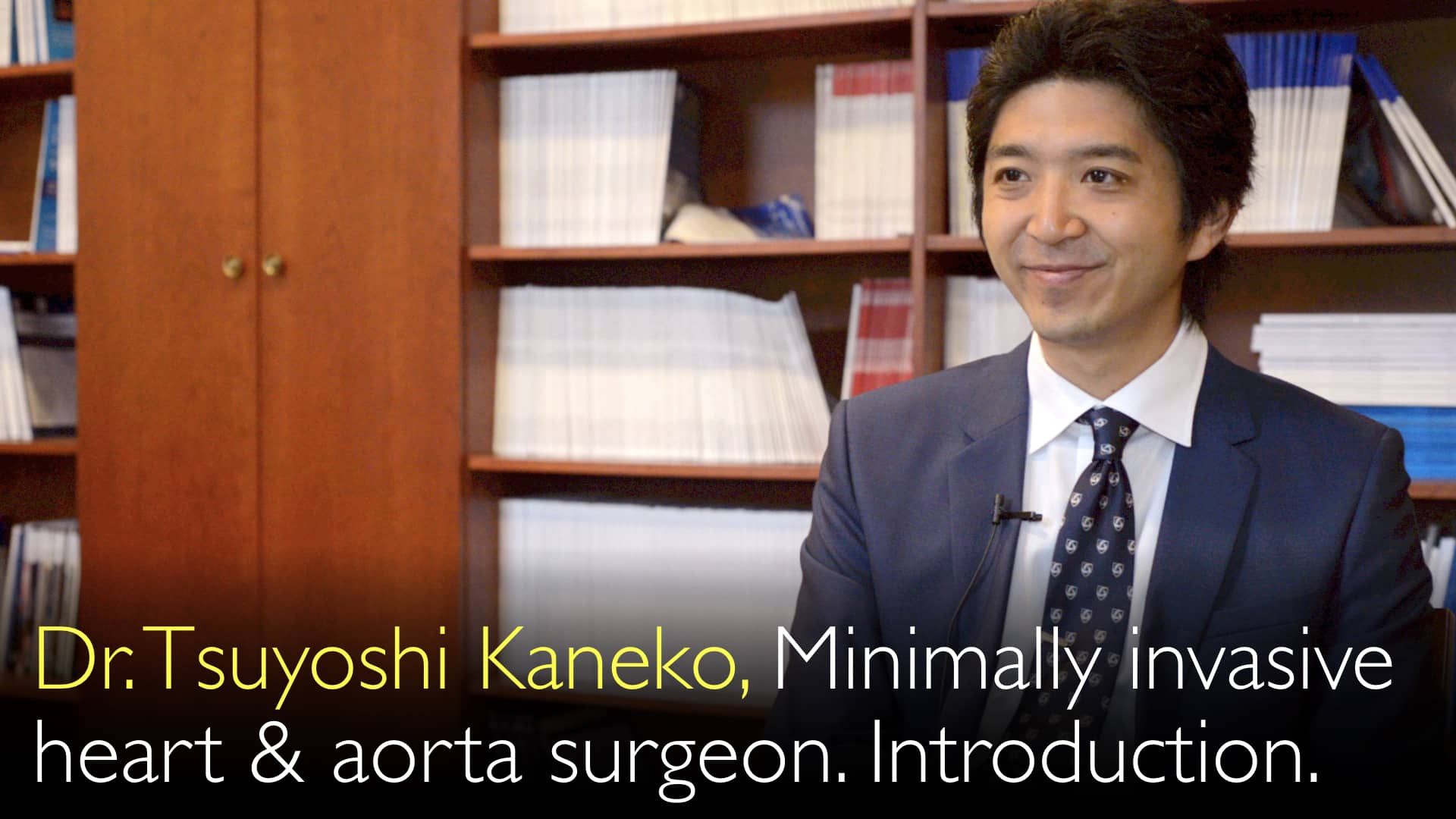Leading expert in cardiac surgery and cross-cultural medical practice, Dr. Tsuyoshi Kaneko, MD, explains the profound differences in doctor-patient relationships and the role of medical second opinions between Japan and the United States. He details the paternalistic model common in Japan, where patients typically accept a physician's recommendations without question, contrasting it with the consultant-client dynamic prevalent in the US, where educated patients actively participate in decision-making and frequently seek second opinions. Dr. Kaneko analyzes the pros and cons of each system, including the impact on surgical training hierarchies and patient empowerment.
Doctor-Patient Relationships and Second Opinions: A Cross-Cultural Analysis
Jump To Section
- Paternal vs. Consultant Dynamics
- Second Opinion Acceptance
- Pros & Cons of Paternal Care
- Surgical Training Hierarchies
- Second Opinion for Patient Empowerment
- Cultural Rebellion Perception
- Informed Medical Decisions
Paternal vs. Consultant Dynamics in Medical Care
Dr. Tsuyoshi Kaneko, MD, highlights a fundamental contrast in medical practice between Japan and the United States. He describes the doctor-patient relationship in Japan as "very paternal," where the physician is viewed as an authority figure, or "the father," whose opinion patients are expected to follow. In this model, Japanese physicians directly state their recommendations, and patients accept them relatively easily. Conversely, Dr. Kaneko observes that in the United States, the dynamic shifts to a consultant-client relationship. This is especially true in regions like the Northeast, where patients are often well-educated and research their conditions beforehand.
This consultant model means American physicians field many questions and provide recommendations, but the ultimate decision to follow treatment or seek a medical second opinion rests with the patient.
Divergent Paths in Second Opinion Acceptance
The concept of a medical second opinion is a key differentiator between these two cultural approaches to healthcare. Dr. Tsuyoshi Kaneko, MD, notes that while the practice is trying to infiltrate Japanese medicine, its adoption is slow due to the entrenched paternalistic system. In the United States, seeking a second opinion is a normalized and often encouraged part of the patient journey, reflecting the proactive, informed nature of American healthcare consumers. Patients use it as a tool for validation and to ensure they are making the best possible decision about their care.
Pros and Cons of a Paternal Care System
Dr. Kaneko provides a balanced view of the Japanese paternalistic model, outlining both its advantages and significant drawbacks. A positive aspect is that it allows physicians to recommend what they genuinely believe is the correct treatment without immediate challenge, potentially streamlining care. However, this places immense responsibility on the doctor, who must bear the full weight of every decision. The major negative, as explained by Dr. Tsuyoshi Kaneko, MD, is the potential for harm if a physician is not acting entirely in the patient's best interest, as there is little built-in mechanism for the patient to question or verify the recommended course of action.
Surgical Training and Professional Hierarchies
The cultural differences extend beyond the clinic into the very structure of medical training. Dr. Tsuyoshi Kaneko, MD, compares the "very, very hierarchical" system in Japan and Europe, where a single professor acts as the "big boss" and subordinates must follow their lead, to the more egalitarian structure in the United States. While American hospitals have Division Chiefs and Department Chairs, individual surgeons are treated more equally and are encouraged to voice their opinions to leadership. Dr. Tsuyoshi Kaneko, MD, notes that Japan is undergoing a slow shift toward the US model, but it remains a deeply hierarchical community.
Second Opinion as a Tool for Patient Empowerment
During his discussion with Dr. Anton Titov, MD, Dr. Kaneko clarifies the empowering intent behind seeking a medical second opinion. He agrees that it is not necessarily an act of contradiction but rather a proactive step for a patient to learn about their disease and build confidence. This process of consultation and verification can lead to a patient following their prescribed treatments with greater conviction and understanding, ultimately improving adherence and outcomes. This perspective frames the second opinion as a positive component of collaborative care.
Cultural Perception of Second Opinion as Rebellion
In the context of a paternalistic system, the act of seeking a medical second opinion takes on a completely different meaning. Dr. Tsuyoshi Kaneko, MD, explains that within the Japanese "father" dynamic, going to another doctor for an opinion can be perceived as an act of rebellion or distrust against the primary physician. It is viewed as going against the authority figure's recommendation rather than as a smart, due-diligence practice. Consequently, Dr. Tsuyoshi Kaneko, MD, states that in Japan, seeking a second opinion can be considered rude, a stark contrast to its acceptance in the United States.
Making Informed Medical Decisions with Cultural Context
Dr. Anton Titov, MD, concludes the conversation by emphasizing the critical importance of understanding cultural context when navigating medical decisions. The insights from Dr. Tsuyoshi Kaneko, MD, reveal that a patient's approach to their care, their relationship with their doctor, and their willingness to seek additional opinions are deeply influenced by their cultural environment. Recognizing whether one is in a paternalistic system like Japan or a collaborative consultant model like the US is essential for both patients and physicians to communicate effectively and achieve the best possible health outcomes.
Full Transcript
Dr. Anton Titov, MD: You were initially trained in Japan. You did your first surgical residency in Japan. Doctors in every country have different approaches to interaction with patients. Doctors select an appropriate treatment differently too.
Dr. Anton Titov, MD: What are some of the differences between Japan and the United States in terms of how medicine and surgery is done? Perhaps you could discuss some differences in communications between doctors and patients in both Japan and the United States.
Dr. Tsuyoshi Kaneko, MD: I can start with the doctor-patient relationship. In Japan, the doctor-patient relationship is very paternal. The patients seek opinion from the doctors. Patients often follow what they are being told, because the physician is "the father". The relationship is very paternal.
Dr. Tsuyoshi Kaneko, MD: The Japanese physicians tend to tell their opinion. The patients tend to accept them relatively easily. On the other hand, the United States is different. I see the patient-doctor relationship in the United States in this way. A physician is more of a consultant.
Many patients, especially in the Northeast of the United States [Boston, New York], are very well-educated. They actually study very well prior to seeing their own physician. The patient-doctor relationship here is more of a consultant-client.
We get asked a lot of questions. We give recommendations. But it is up to patients whether they follow the recommendation. Or they can seek a medical second opinion if they don't like it.
Dr. Tsuyoshi Kaneko, MD: The concept of second opinion is trying to infiltrate in Japan. But the doctor-patient relationship in Japan is very paternal. I think medical second opinion is not really infiltrating as fast as many thought.
A lot of patients in Japan tend to go to the doctor and just follow doctor’s recommendations. I think that has positive and negative sides. For the doctors, you can freely recommend what you think is correct. But it really puts the doctors in a tough spot.
Because they have to take the responsibility for all of their recommendations. The negative side of paternalistic patient-doctor relationship exists. If the doctors are not really thinking about patient's interest, then it can really harm the patient. I think it does have pros and cons.
Dr. Tsuyoshi Kaneko, MD: It's very hard for me to say which side is better.
Dr. Anton Titov, MD: Let’s discuss the structure of training of surgeons.
Dr. Tsuyoshi Kaneko, MD: Japanese surgeons are very hierarchical. They are much like the Europeans. They have one professor, who is the "big boss”. All other physicians have to follow the boss's lead.
Dr. Anton Titov, MD: The United States is different.
Dr. Tsuyoshi Kaneko, MD: Here we do have Division Chiefs, we have Department Chairs. But we are all individual surgeons under the Division Chiefs. So we are all treated equally. We have the voice to speak up to our Chiefs. That usually does not happen in Japan. It is much more hierarchical.
However, I did hear recently that hierarchy has been changing a little bit. Surgery training is trying to be more like the United States format. But it's still an ongoing process. I think Japan remains to be a very hierarchical community.
Dr. Anton Titov, MD: Patients might seek a second opinion. But it is not because they disagree with their physician. It is because they just want to make sure that what doctors are recommending is correct. Patients try to learn about their disease through expert medical opinion.
Dr. Tsuyoshi Kaneko, MD: Absolutely! Medical second opinion is not necessarily contradicting the treatment course that patients are prescribed.
Dr. Anton Titov, MD: Medical second opinion allows a patient to be more proactive. The patient is learning and having more confidence. Therefore, the patient is following the recommended treatments better.
Dr. Tsuyoshi Kaneko, MD: Correct. But in a paternal world, I think medical second opinion is viewed as a rebellion against the recommendation. You are going against "your father". I think that is a reason why medical second opinion is not viewed similarly as getting a second opinion is viewed in the United States.
In Japan, medical second opinion can be considered rude rather than a smart move.
Dr. Anton Titov, MD: Thank you for illuminating the differences between relationships between a patient and a physician in Japan and in the United States. It is important to make medical decisions with the cultural standpoint in mind.





